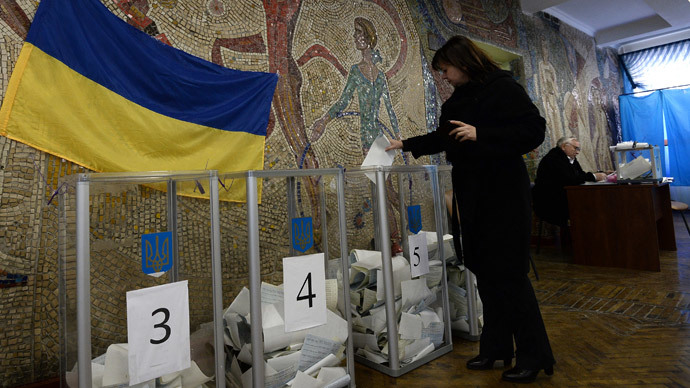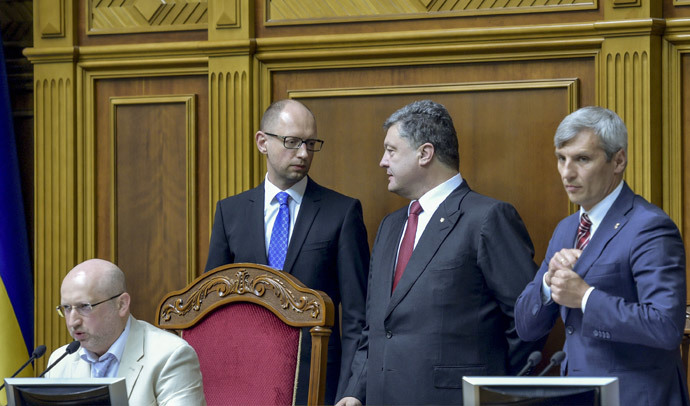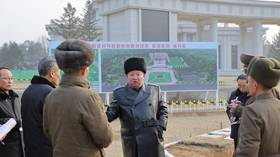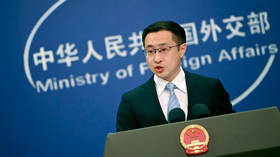‘Main legitimacy concern: Ukrainian parties opposed to ‘Euromaidan’ faced restrictions’

The main concern about the legitimacy of Ukrainian vote comes from restrictions on anti-Maidan parties, including a campaign against the Communist party which intimidated its constituency, Prof. Nicolai Petro from University of Rhode Island, told RT.
RT:Russia has accepted the elections were legitimate. Ukraine and its Western partners praise them as highly democratic and fair - how deserved is that, considering the massive number of people who didn't even vote?
Nicolai Petro: I think the main concern about the legitimacy of the elections comes from the restrictions that were suffered by the Communist Party and other parties that were critical of the ‘Euromaidan’ during the campaign. Whether or not people vote has to be considered up to them.
RT:Ukraine's President has said one of the main achievements of the election has been the failure of the Communists to make it back into Parliament, but in the past that party used to enjoy solid support. So what's gone wrong for them?
NP: There was very significant campaign against them and a lot of that was accompanied by public demonstrations of anger against communist symbols that no doubt intimidated a constituency which throughout Eastern Europe have a lot of elderly people. I think they just decided that it was not worthwhile for them just as a matter…of a personal safety to go out and vote. It is unlikely that the support for the Communist Party decreased from 11% to 3% in such a short period of time. But the context of society in which elections are taking place makes it far less likely for people who have those sympathies to decide to vote at all.
RT:The new Ukrainian Rada will be the most pro-European ever. Does that mean the aspirations of those who started the “Euromaidan” movement almost a year ago will be fulfilled?
NP: I am not sure. I would characterize this as pro-European because I don’t see that as a significant defining line in Ukrainian society. I think being pro-European in some general context was popular throughout Ukraine as long as it didn’t mean being anti-Russian. I think the real dividing line and the most difficult issue facing this parliament is whether to continue the war in the East or not. So far we have a ceasefire that was implemented with the support of the Poroshenko bloc. But what I would consider the party that have been on record as opposing the Minsk accords constitute at least a third of the seats, they have about roughly a third of the seats. On the other side, those who support the Minsk accords would constitute the Poroshenko bloc and they can rely for support only on the opposition bloc about 31%. So the swing votes, the votes in single-mandate districts will be very significant in deciding whether or not the peace process will continue and ultimately it’s just not clear how the parliament will decide.
RT:How will the West now build on its relations with the new Ukraine? What about the radicals in the new parliament? Has the EU been concerned about the rise of the ultra-nationalists within the Ukrainian authorities?
NP: I don’t think it changes Western attitudes or policies at all. The one thing the new government has to be cautious about is expressions of national extremism which manifest themselves in open anti-Russian sentiment against Ukrainian citizens who feel close to Russia culturally. That constituency is clearly not prominent in the current parliament. If the Poroshenko government is not careful, and its supporters are not careful, that will eventually sour western attitudes toward this government. If the Russian speaking constituency, the minority, which even in the present parliament is at least 10% is not granted some ability to voice its concerns.

RT: How can you describe the conflict between the Poroshenko government and Yatsenyuk? Why they don’t get along so far?
NP: It is hard to say. We do have a divide: the Poroshenko bloc did not want Yatsenyuk to continue to be prime minister. Yatsenyuk’s party did remarkably well, so he is likely to become prime minister. This tension between the presidency and the prime minister is an old one in Ukrainian politics and we are simply seeing it reconstituted in the present circumstances. However, this is in the current circumstances less of an ideological divide than it is a conflict of personalities. If the personalities conflict at the top, between a president and a prime minister can be kept to a minimum and Yatsenyuk is not overly-ambitious in trying to run the country and allows Poroshenko a clear mandate and arena of his own, then it is possible that it will last a while, probably not more than a year. If those tensions arise quickly over specifically such matters as funding the military campaign in the East, and whether or not to support the Minsk peace accords, then it is likely to lead to a direct conflict between the Yatsenyuk government - assuming that he is nominated to be Prime Minister - and the president and may lead to a new elections because the only alternative constituency is even further to the right than the Popular Front.
RT: What about gas agreements? Do you think there are still some points that require discussion?
NP: No, I don’t because all of the aspects of the gas agreement have been negotiated and agreed to except for the amount of the loan that Ukraine needs to pay for its debt without which Russia will not allow gas to flow, without the amount that it ships being paid for in advance. The decision on that loan, at least as President Putin sees it, is entirely in the hands of European Union, how it wants to negotiate that loan. Clearly, Ukraine does not have the money to pay for it. There is a conceptual understanding and agreement that the EU or some private bank within Europe must provide that loan guarantee until the next IMF tranche comes through. So it is basically entirely in the hands of the EU negotiators at this point.
The statements, views and opinions expressed in this column are solely those of the author and do not necessarily represent those of RT.
The statements, views and opinions expressed in this column are solely those of the author and do not necessarily represent those of RT.











